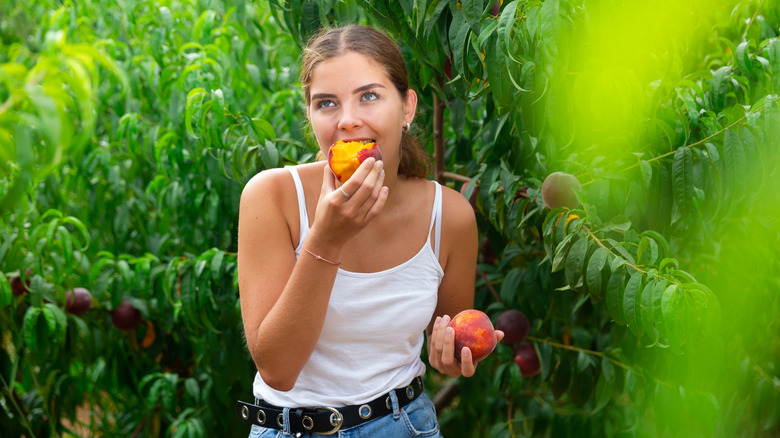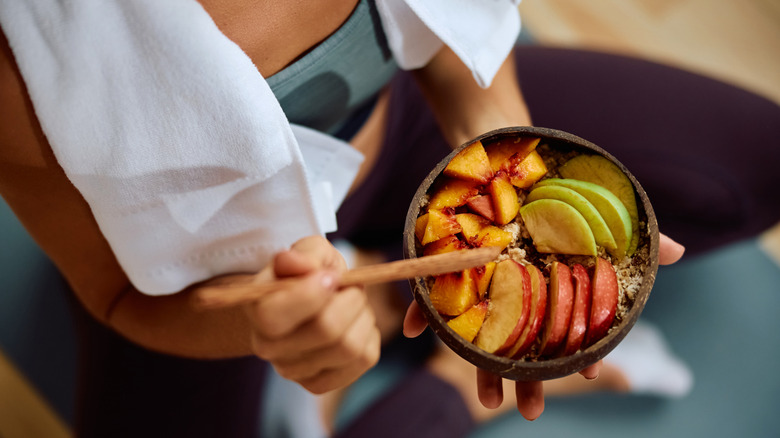
If you’re looking for a tasty low-carb fruit that’s incredibly refreshing on a hot summer day, look no further than peaches. Packed with antioxidants and essential minerals and nutrients, a medium-sized peach contains only 58 calories and 14 grams of carbs. Peaches are also rich in fiber, promoting gut health, and vitamin C, and they feature heart-healthy properties, including the ability to help reduce cholesterol levels.
Moreover, peaches have the potential to prevent cancer. The flesh and skin of peaches contain two significant antioxidants: carotenoids and caffeic acid. According to a 2011 study published in Molecular and Cellular Biochemistry, caffeic acid has an anticancer effect when consumed. It’s also notable that olive oil, coffee, and various other fruits and vegetables contain caffeic acid. A 1995 study published in the Journal of Cellular Biochemistry identified that carotenoids also offer protective properties against cancer.
While peaches can contribute to cancer prevention, it’s important to note that their molecular composition specifically benefits certain types of cancer, such as breast cancer.
How peaches help prevent breast cancer

According to the American Cancer Society, 13% of women will develop breast cancer during their lifetime, making it the most prevalent cancer among women in the U.S., excluding skin cancer. Projections indicate that by 2025, over 300,000 women in the U.S. will be diagnosed with breast cancer, and approximately 42,000 will die from the disease. Globally, in 2022, breast cancer was responsible for 670,000 deaths, and it’s the most common cancer among women in 157 countries, as reported by the World Health Organization. These are statistics that warrant serious attention.
A 2013 study in Breast Cancer Research and Treatment found that postmenopausal women who consumed at least two or more peaches daily reduced their risk of developing breast cancer by 41%. Nectarines seem to offer the same effect. Another study discovered that the cancer-fighting benefits extend beyond the peach skin and flesh to the seeds. According to a 2003 study in the Biological and Pharmaceutical Bulletin, compounds found in peach seeds help benign tumors remain non-cancerous.
Furthermore, peaches contain polyphenols, which, depending on the type of breast cancer, can help reduce the growth of cancerous cells and their spread throughout the body. A 2014 study in Food Chemistry found that polyphenols can target cancerous cells without harming healthy cells in breast cancer cases.
How to incorporate more peaches into your diet

The simplest way to enjoy more peaches is to grab a fresh peach and eat it, but after a while, you might want to explore other ways to savor them. The great thing about peaches is that they don’t need to be fresh to provide their remarkable health benefits. A 2013 study published in the Journal of the Science of Food and Agriculture found that canned peaches have the same nutritional content as fresh ones, which is excellent news for the winter months when fresh peaches aren’t readily available.
Peaches can be sliced and added to cereal, yogurt, homemade granola, or salads. For dessert lovers, peach cobbler, caramelized baked peaches, or peach tarts are sure to satisfy. Peach salsa, peach jam, or pickled peaches provide a convenient peach condiment or snack when cooking time is limited. If you’re hosting a summer garden party and want to offer your guests the health benefits of peaches, consider serving peach margaritas, peach lemonade, or bourbon peach smash, which are not only delicious drinks but also perfectly suited for summer. Given their versatility, peaches can be included in almost any dish if you’re creative enough.
“`




